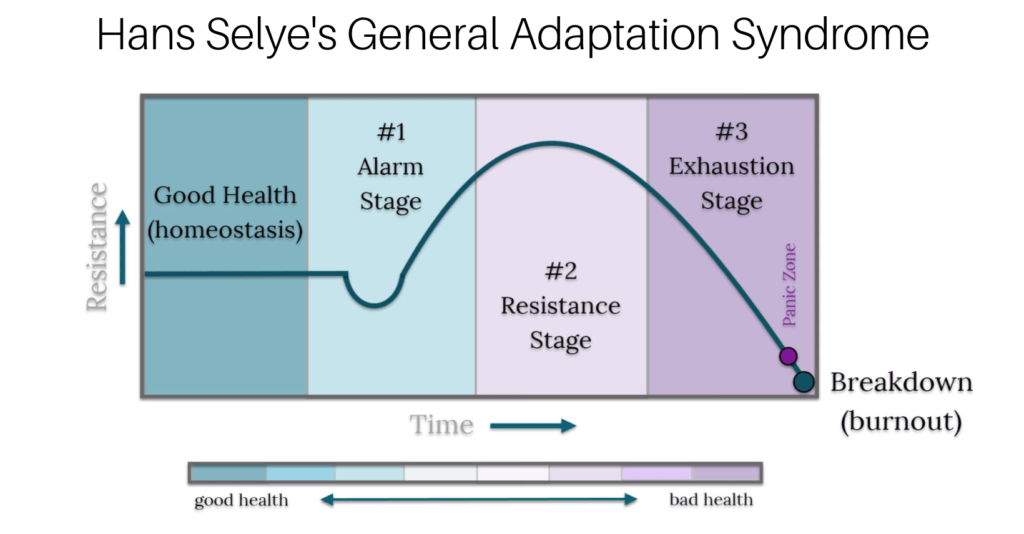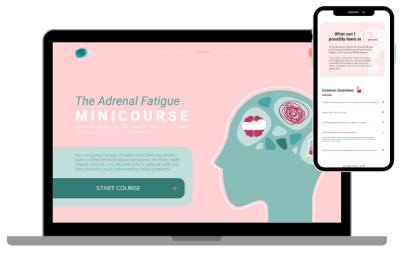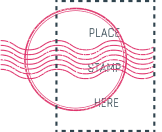The stress theory behind Adrenal Fatigue has long been studied and proven, beginning with Hans Selye’s General Adaptation Syndrome (GAS).
Hans Selye coined the word stress. He was an endocrinologist, working and researching during the mid 1900s, and won the Nobel Prize 17 times.
In medical school, Selye noticed that people with chronic illnesses generally displayed very similar symptoms. He eventually suspected a common underlying dysfunction and tested his theory by studying rats. Selye found that no matter how he would “stress” the rats, they would all develop the same set of symptoms.
He coined this dysfunction The General Adaptation Syndrome. Selye’s experiments in the ’40s and ’50s led to his book The Stress of Life, published in 1956. We now call this set of symptoms Adrenal Fatigue, or Stress Response Dysfunction.

Selye’s work is not perfect by any means. His theories and postulates have been challenged, but his general concept holds true to this day. His work initiated the drive for the incredible volume of stress and adrenal research we have available to us now.
Hans Selye’s General Adaptation Syndrome
There are three main phases of the General Adaptation Syndrome: alarm, resistance, and exhaustion. These divisions are roughly equivalent to the early, middle, and late stages of Adrenal Fatigue.
Alarm Phase
In the alarm phase, the system is pumping out an excess of stress hormones. This equates to a constant stimulation of the fight or flight system, and symptoms tend to resemble that response.
Upregulated cardiopulmonary system
- Increased blood pressure
- Heart palpitations
- Anxiety
- Insomnia
Upregulated metabolic system
- Blood sugar imbalances
- Weight loss
- Redistribution of fat around the abdomen
Digestive disorders
- Heartburn and indigestion
- Irritable Bowel Syndrome
Suppressed immune system and thyroid function
- Poor wound healing
- Allergies and asthma
- Frequent and recurring illness
- Epstein-Barr Virus (EBV)
- Disorders of the thyroid gland
Reproductive hormone dysfunction
- Premenstrual Syndrome
- Difficult menopause
- Loss of libido
- Decrease in fertility
Learn what’s really going on with your body and why you’re still experiencing symptoms…despite all your attempts to get better.
Learn what’s really going on with your body and why you’re still experiencing symptoms…despite all your attempts to get better.
Resistance Phase
During this phase, patients can see a conglomeration of symptoms, a mix of symptoms from the alarm and exhaustion phases.
Patients will present with fatigue, but they can’t sleep. They will be anxious but will complain of depression, as well. Thinking straight is difficult, but the mind won’t shut off. Patients feel “wired” but are often tired at the same time.
Diagnosing is difficult, and most doctors will then treat symptoms rather than addressing the root cause.
Many of these symptoms depend somewhat on the genetic predisposition of the individual patient. For example, some in the resistance phase tend more toward depression, while others in the same phase tend toward anxiety. Some will maintain their libido, while many others will lose these functions completely.
This resistance phase confuses many physicians; the presenting symptoms vary so much from day to day, as well as patient to patient. Diagnosing is difficult, and most doctors will then treat symptoms rather than addressing the root cause.
The Final Phase of Hans Selye’s General Adaptation Syndrome: Exhaustion
In this phase, symptoms of fatigue, pain, depression, residual anxiety, “brain fog,” short-term memory loss, and cognitive dysfunction occur. Weight gain, blood sugar imbalance, and exercise intolerance increase.
In the exhaustion phase, the adrenal hormones have been consumed. The patient is now deficient in many hormones, metabolic processes, vitamins, nutrients, and antioxidants.
Patients will experience a further increase in the symptoms mentioned in the Alarm phase.
- Worsening allergies and asthma
- Autoimmune disease
- Leaky gut and intestinal candidiasis
- Food intolerances
- Infertility
- Difficult menopausal transition
- Osteoporosis
The Sneaky Secondary Effects of Adrenal Fatigue
There are often significant secondary effects of a chronically stimulated stress response that can create various symptoms of their own. These include increased oxidative stress, mitochondrial dysfunction, methylation defects, ad poor detoxification.
These “down-line” effects cannot be ignored. They can, however, repair on their own given the proper treatment of Adrenal Fatigue. Many physicians caught up in discovering and uncovering these various secondary effects without getting to the underlying cause.
For this reason, most of my patients have already seen specialist after specialist. They’ve been subjected to numerous tests and are prescribed many “band-aid” medications. No one is acknowledging the stress response dysfunction as the root cause, and that is one of the main obstacles for a patient’s healing.





















